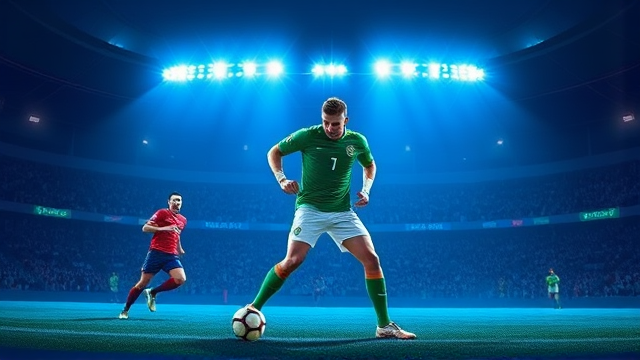Collins still at a loss to explain Yerevan defeat
The Republic of Ireland's 2-1 defeat to Armenia last month remains a perplexing anomaly in the statistical landscape of international football, a result that defies conventional analysis and leaves captain Nathan Collins grappling for explanations ahead of Tuesday's crucial rematch at Dublin's Aviva Stadium. This wasn't merely a loss; it was a seismic collapse against Group F's lowest-ranked side that effectively derailed Irish World Cup qualifying hopes, creating a statistical outlier as baffling as Barcelona's 8-2 defeat to Bayern Munich—a result that similarly defied all pre-match metrics and historical precedent.What makes this Armenian upset particularly confounding is its stark contrast to Ireland's courageous performance against group favorites Portugal just days later, where they narrowly lost 1-0 to a 91st-minute Ruben Neves header in a display that showcased tactical discipline and defensive organization completely absent in Yerevan. Collins, the Brentford defender who anchors Ireland's backline, struggles to articulate what precisely unraveled during that embarrassing reverse, describing football's inherent unpredictability where momentum shifts can transform matches in moments, yet this explanation feels insufficient for a collapse of such magnitude against opponents ranked 95th globally.The performance gap between these two matches reveals deeper issues within the squad—the connective tissue that binds a team collectively disappeared in Armenia, replaced by disjointed movement and hesitant decision-making that allowed the hosts to grow in confidence, seize control of midfield battles, and ultimately look like the superior side despite Ireland's superior individual talents and historical pedigree. This pattern of inconsistent performance isn't unique to Ireland; it echoes England's shocking defeat to Iceland in Euro 2016 or Germany's loss to North Macedonia in 2021—established football nations succumbing to supposedly inferior opponents through a perfect storm of complacency, tactical rigidity, and opponent opportunism.For Ireland specifically, the Armenian collapse represents the latest chapter in a qualifying campaign that has yielded just one point from three matches, leaving them bottom of Group F and facing mathematical elimination unless they engineer an immediate turnaround starting with Tuesday's fixture. Yet the Portugal performance offers a blueprint for redemption, demonstrating that this squad possesses the technical ability and tactical organization to compete with Europe's elite, much like Greece's 2004 European Championship victory proved that disciplined defending and strategic counter-attacking can overcome individual quality deficits.Manager Heimir Hallgrimsson now faces the psychological challenge of transferring that Lisbon resilience to what should be a straightforward home victory, ensuring his players approach Armenia with the same intensity they reserved for Cristiano Ronaldo and company rather than the lethargic display that characterized their previous encounter. The broader context reveals this isn't merely about three points—it's about restoring credibility to Irish football after years of underperformance, with victory potentially lifting Ireland to second place and reinstating belief that qualification remains possible despite the mathematical improbabilities.Collins speaks of the privilege and pressure representing Ireland carries, that iconic green jersey symbolizing childhood dreams for every Irish player, yet that very symbolism may have contributed to their Yerevan paralysis—the weight of expectation transforming into performance anxiety against opponents unburdened by such historical baggage. Modern football analytics struggle to quantify these psychological factors, yet they often determine outcomes more decisively than formations or possession statistics, particularly when underdog opponents sense vulnerability and exploit it with the ruthless efficiency Armenia displayed.As Tuesday's match approaches, Ireland must channel the defensive organization that frustrated Portugal for ninety minutes while rediscovering the creative verve that has been conspicuously absent throughout qualifying, balancing tactical discipline with the attacking fluency needed to breakdown Armenia's likely defensive setup. The historical precedent suggests teams recovering from such embarrassing defeats either collapse entirely or use the experience as catalytic motivation—Ireland's response will determine whether the Armenian upset becomes a footnote in a successful redemption story or the definitive moment their qualification hopes evaporated. For Collins and his teammates, this represents more than just another match; it's an opportunity to exorcise the ghosts of Yerevan while proving that the Portugal performance represents their true quality rather than the statistical aberration that preceded it.
Latest News
Former Formula 1 driver Johnny Herbert has thrown a crucial caution flag on the hype train surrounding Isack Hadjar, firmly stating that Red Bull should resist
5 minutes ago0 comments
The perennial debate over foreign player quotas in domestic football leagues has once again ignited in Russia, with Sports Minister Mikhail Degtyarev
19 minutes ago0 comments
The welterweight division just got a whole lot more interesting with the official booking of Sean Brady versus Michael Morales for UFC 322 on November 16, a
35 minutes ago0 comments
The narrative surrounding the KHL's newest geographic oddity, the Shanghai-based club now operating out of Saint Petersburg's SKA Arena, was supposed to be one
45 minutes ago0 comments
The beautiful game, so often a theater of raw passion and tactical genius, was once again overshadowed by the specter of contentious officiating, a narrative
1 hour ago0 comments
In a powerful testament to the unifying spirit of athletics, Hong Kong is poised to become a vibrant stage for the upcoming National Games, with plans for a
1 hour ago0 comments
The path of a fighter is often measured in wins and losses, in titles won and opportunities seized, but for Felix Cash, the truest battle was waged not under
2 hours ago1 comments
In a development that has sent a collective shudder through the world of women’s sports, a deeply invasive and unscientific trend has emerged from the murky
2 hours ago0 comments
It’s quiet here...Start the conversation by leaving the first comment.
